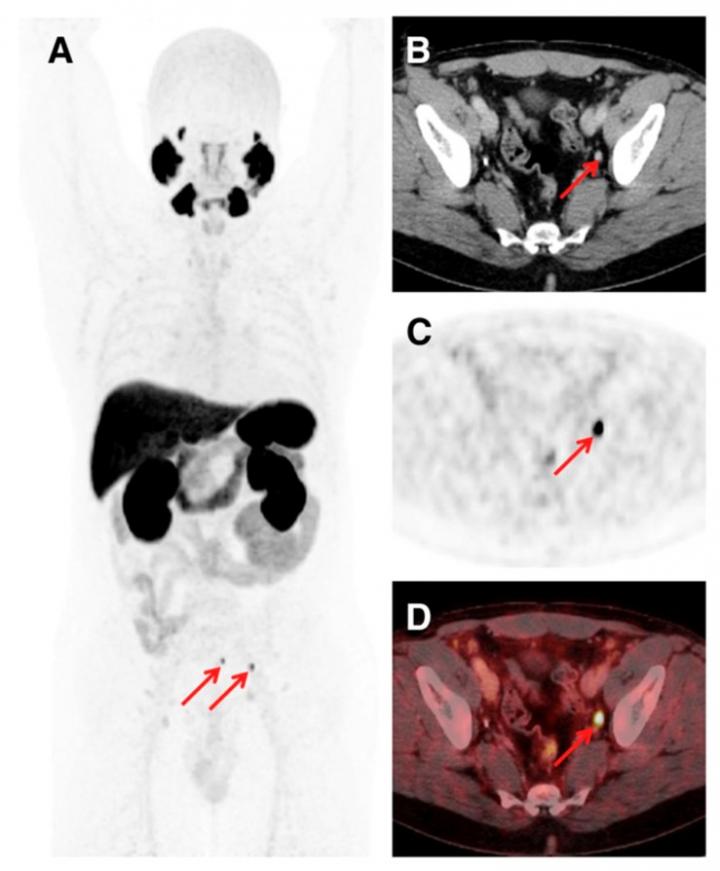
Credit: Giesel FL, et al. Journal of Nuclear Medicine 2019
Osaka University Hospital began Japan’s first clinical research for diagnosis of prostate cancer (PC) using PET (positron emission tomography) scan results in September 2019. In this study, the 18F-labelled PSMA-1007 radiotracer (fluorine-18 [18F]-PSMA-1007) that targets Prostate Specific Membrane Antigen (PSMA), was used as a PET agent.
F-18 labelled PSMA-1007 has a strong binding affinity for the PSMA, which is overexpressed in the primary lesion in PC as well as recurrent and metastatic PC. In the first PSMA-PET performed on September 3, recurrent and metastatic PC were detected, which had not been identified by conventional diagnostic imaging, such as computerized tomography (CT) and bone scintigraphy.
F-18 labelled PSMA-1007 is produced at the hospital using a cyclotron and an automated synthesis module for PET, but the module was manufactured overseas. However, in joint studies with Sumitomo Heavy Industries, Ltd., the hospital succeeded in the stable domestic production of automatic synthesis modules. Although it is necessary to conduct clinical trials for the module, it will be used in a wide variety of clinical applications in Japan and across Asia.
PSMA is a promising molecular target in PC management. Research shows that labeling with α- or β-emitting radionuclides will exert a great curative influence on progressive cancer. Clinical trials for PSMA labeled with the β-emitting radionuclide lutetium-177 (Lu-177) have begun mainly in Europe. However, Osaka University aims to spread nuclear medicine that uses drugs labeled with α-emitting radionuclides, which have higher therapeutic effects than β-emitting radionuclides, developing PSMA drugs using the α-emitting radionuclide, astatine (At-211).
In the future, through repeated clinical research, the researchers will evaluate cases in which F-18 PSMA-1007 PET is more helpful than conventional diagnostic imaging methods. They will also study F-18 PSMA-1007 PET as a tool in pretreatment assessment to determine the types of patients for which PSMA therapy is effective.
PC remains the second most commonly diagnosed cancer in Japan and its incidence is increasing. The sensitivity of CT and bone scintigraphy is not enough for the detection of recurrent and metastatic PC.
Principal investigator of this research project Dr. Tadashi Watabe says, “Implementing this clinical research will lead to accurate diagnosis of metastatic and recurrent prostate cancer and will become a much more precise assessment method for offering patients the best treatment.”
###
Outline of Clinical Research for F-18 PSMA-1007 PET
Scientific title: Diagnostic Performance of PET Imaging for Prostate Specific Membrane Antigen (PSMA)
Objectives: Objectives of this clinical research are to clarify the diagnostic ability of PSMA-PET and detailed clinical conditions of prostate cancer by performing PET/CT imaging on patients with prostate cancer after injection of F-18-PSMA-1007 solution and comparing the results with those of conventional imaging techniques (CT/bone scintigraphy etc.)
Eligibility: Adult men who are diagnosed with prostate cancer and undergo or will undergo CT scanning and/or bone scintigraphy, and patients who are suspected to have metastasis or recurrence after treatment
Target sample size: 50
Period: September 1, 2019 ~ March 31, 2022
Principal investigator: Tadashi Watabe (Department of Nuclear Medicine, Osaka University Hospital)
Details: See UMIN-CTR Clinical Trial (Unique ID issued by UMIN: UMIN000037697)
The research project is funded by Japan Science and Technology Agency.
About Osaka University
Osaka University was founded in 1931 as one of the seven imperial universities of Japan and now has expanded to one of Japan’s leading comprehensive universities. The University has now embarked on open research revolution from a position as Japan’s most innovative university and among the most innovative institutions in the world according to Reuters 2015 Top 100 Innovative Universities and the Nature Index Innovation 2017. The university’s ability to innovate from the stage of fundamental research through the creation of useful technology with economic impact stems from its broad disciplinary spectrum.
Website: https:/
Media Contact
Saori Obayashi
[email protected]
81-661-055-886
Original Source
https:/




